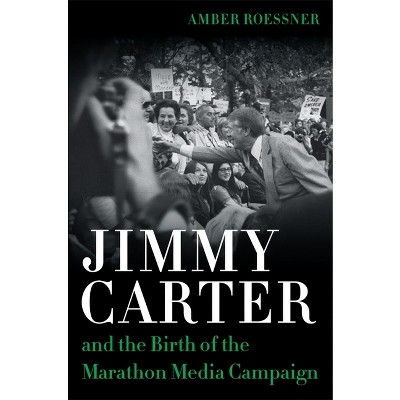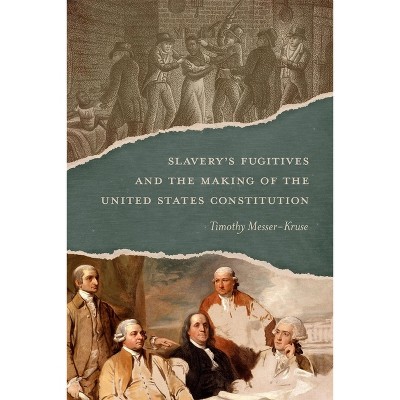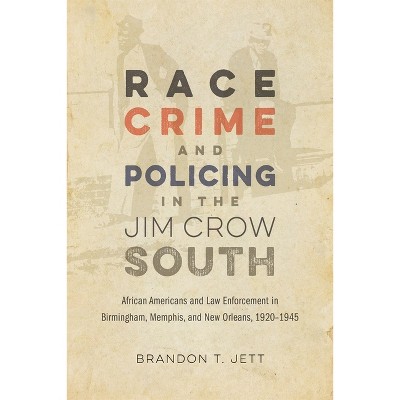Gin, Jesus, and Jim Crow - (Making the Modern South) by Brendan J J Payne (Hardcover)

About this item
Highlights
- In Gin, Jesus, and Jim Crow, Brendan J. J. Payne reveals how prohibition helped realign the racial and religious order in the South by linking restrictions on alcohol with political preaching and the disfranchisement of Black voters.
- About the Author: Brendan J. J. Payne is chair of the Department of History at North Greenville University in South Carolina.
- 290 Pages
- History, United States
- Series Name: Making the Modern South
Description
About the Book
"State and local laws against the sale of alcohol arrived in the US South in tandem with white supremacist Jim Crow laws, years before national prohibition. According to Brendan Payne, this was no coincidence. In 'Gin Crow,' he reveals that white prohibitionists encountered difficulty passing anti-alcohol laws until they blamed their failures on racial and ethnic minorities--two groups who tended to vote against prohibition. White 'drys' gradually linked what they saw as a holy crusade against alcohol to white supremacy, a move that led to defeating 'wets' through voter suppression laws. While for white drys, prohibition was God's triumph over demon rum, for minority voters, prohibition was simply another facet of Jim Crow. Payne shows that minorities fiercely resisted prohibition and believed God was on their side. Joined as a coalition of Catholics, Episcopalians, and Lutherans, along with Black Baptists and Methodists, they made common cause against the drys, citing Christian tradition, the Bible, and personal liberty. German, Mexican, and African Americans forged political alliances with brewers, who paid their poll taxes to get out the vote. In states like Texas, Florida, and Arkansas, Black voters decided tight statewide elections against prohibition as late as 1912, well after most scholars thought African American voters in the South had ceased to matter. While some recent scholarship has emphasized the importance of prohibition in creating the Bible Belt's conservative brand of politics among white Protestants, Payne demonstrates that faith played a role on both sides of the prohibition culture war. Indeed, he suggests that racial minorities were just as significant as whites in the contest. Focusing on Texas, the largest southern state, Payne shows that the phenomenon of an interracial, interdenominational coalition defying prohibition, and by extension, Jim Crow, lasted from 1885 to around 1935. He also suggests the legacy of 'Gin Crow' prohibition remains with us today in debates over race, religion, and politics in the South. While white prohibitionists created the Bible Belt, anti-prohibitionists showed the potential power of religiously charged, interracial politics. That coalition rose again during the Civil Rights Movement and shows hints of resurfacing in the early twenty-first century"Book Synopsis
In Gin, Jesus, and Jim Crow, Brendan J. J. Payne reveals how prohibition helped realign the racial and religious order in the South by linking restrictions on alcohol with political preaching and the disfranchisement of Black voters. While both sides invoked Christianity, prohibitionists redefined churches' doctrines, practices, and political engagement. White prohibitionists initially courted Black voters in the 1880s but soon dismissed them as hopelessly wet and sought to disfranchise them, stoking fears of drunken Black men defiling white women in their efforts to reframe alcohol restriction as a means of racial control. Later, as the alcohol industry grew desperate, it turned to Black voters, many of whom joined the brewers to preserve their voting rights and maintain personal liberties. Tracking southern debates about alcohol from the 1880s through the 1930s, Payne shows that prohibition only retreated from the region once the racial and religious order it helped enshrine had been secured.Review Quotes
"Creatively framed and carefully argued, Gin, Jesus, and Jim Crow convincingly demonstrates how the region's anti-liquor campaigns--conceived of and led by white evangelical clergy--and subsequent enforcement regimes overlapped with the institutionalization of anti-Black policies. . . . By weaving together half a century of regional history, Payne has provided an effective roadmap for future scholarship."--American Historical Review
"Brendan J. J. Payne's Gin, Jesus, and Jim Crow sheds new light on the pivotal role played by Black voters in the debate over liquor prohibition in the post-Reconstruction South. . . . Payne's account of the rise and fall of "Gin Crow" is carefully documented, engagingly written, and largely persuasive. Moreover, the author deserves credit for highlighting the careers of several Black ministers and political operatives . . . who have received comparatively little attention from scholars."--Journal of American History
"Brendan Payne's Gin, Jesus, and Jim Crow makes a thoughtful and carefully researched intervention into the growing body of scholarship on southern prohibition and the increasingly nuanced historiography of liquor politics in the former Confederate states."--Journal of Southern History
"The main strength of this well-researched book is how Payne (North Greenville Univ.) views available sources 'through the twin lenses of race and religion.' . . . This is an important book."--CHOICE
"'Gin Crow' was a close cousin to Jim Crow, as Brendan Payne shows in this stimulating study of the complexities of religion, prohibition, and politics in the South from the late nineteenth century to the 1930s. Neglected religious wets, especially African Americans, get their say here, and southern prohibition's connection to the rise of the Jim Crow system is deftly explained and deconstructed. An essential work for students of southern religion and politics."
--Paul Harvey, Distinguished Professor of History at the University of Colorado and author of Christianity and Race in the American South: A History"In Gin, Jesus, and Jim Crow, Brendan Payne offers a nuanced description of the motivations and activities of Black southerners who fought against prohibition, a fight they saw as one of their only opportunities to push back against the increasing tide of Jim Crow laws. The inclusion of voices long neglected by scholars marks an important addition to our understanding of the prohibition movement in general, and its role in the South in particular. Payne's larger thesis that prohibition was intimately bound up in Jim Crow and that the former became less necessary as the latter took greater institutional hold is one that will guide research for many years to come. This is most definitely a work that should be widely read and discussed."
--Michael Lewis, professor of sociology at Christopher Newport University and author of The Coming of Southern Prohibition: The Dispensary System and the Battle over Liquor in South Carolina, 1907-1915"This is a fascinating book, one that should be of interest to scholars and students alike. Through clear, accessible prose, with an eye toward understudied movements and shifting alliances, Payne gives readers a new lens through which to see contestations over strong drink and the import of this struggle to the history of race and religion in the American South."
--Aaron Griffith, assistant professor of history at Whitworth University and author of God's Law and Order: The Politics of Punishment in Evangelical AmericaAbout the Author
Brendan J. J. Payne is chair of the Department of History at North Greenville University in South Carolina.
Shipping details
Return details
Guests also viewed
Discover more options









